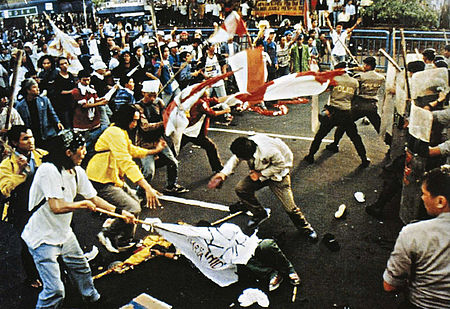Trisakti Museum
1998 in IndonesiaAsian museum stubsHistory museums in IndonesiaHistory of JakartaHuman rights museums ... and 7 more
Human rights organizations based in IndonesiaIndonesian building and structure stubsMuseums in JakartaMuseums with year of establishment missingUniversity museums in IndonesiaUse mdy dates from May 2018West Jakarta

Trisakti Museum or May 12 Tragedy Museum is a human rights museum in Jakarta, Indonesia. The museum documents the active role of Indonesian students at Trisakti University in fighting for democracy and human rights.The museum briefly tells about four students who were shot on May 12, 1998. In the museum there are short articles, a collection of news from newspapers, ornaments, demonstration photographs, photographs of the deceased, and their relics.
Excerpt from the Wikipedia article Trisakti Museum (License: CC BY-SA 3.0, Authors, Images).Trisakti Museum
Trans Jakarta Busway Koridor 9, Special Capital Region of Jakarta Grogol Petamburan (West Jakarta)
Geographical coordinates (GPS) Address Nearby Places Show on map
Geographical coordinates (GPS)
| Latitude | Longitude |
|---|---|
| N -6.168471 ° | E 106.78909 ° |
Address
Universitas Trisakti Kampus A
Trans Jakarta Busway Koridor 9
11450 Special Capital Region of Jakarta, Grogol Petamburan (West Jakarta)
Indonesia
Open on Google Maps







